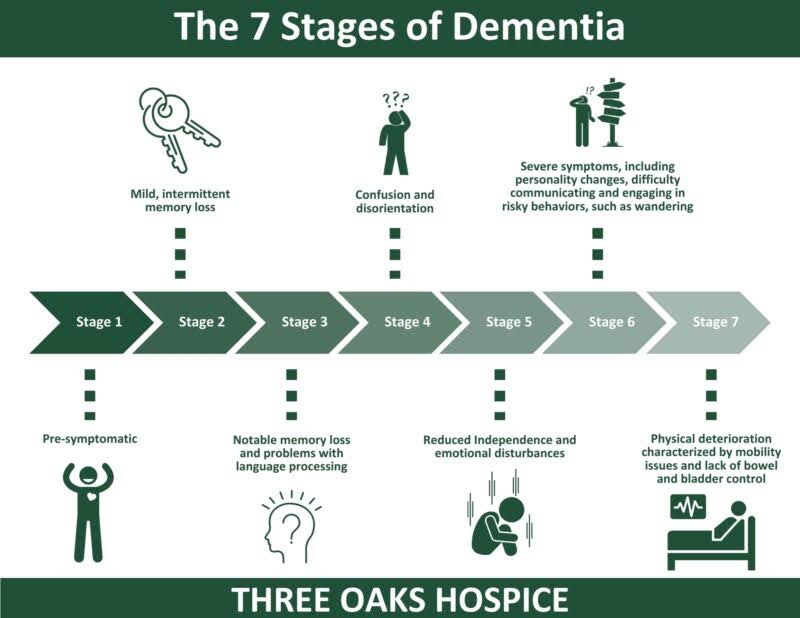
Caring for someone with dementia presents unique physical, emotional and logistical challenges. Three Oaks Hospice provides specialized hospice care specifically designed for dementia patients in advanced stages, offering personalized support tailored to both patients and caregivers. Our approach focuses on dignity, comfort and quality of life, providing symptom management, pain relief and emotional support.
Looking for hospice for dementia? Discover how Three Oaks Hospice provides compassionate care tailored to your loved one’s needs.
Recognizing When to Call Hospice for Dementia
Dementia generally progresses slowly, making it challenging to determine when hospice care for dementia becomes necessary. Engaging early with healthcare providers can help families identify the optimal timing for hospice support.
Common indicators suggesting it may be time to discuss hospice include:
- Severe mobility difficulties without assistance
- Significant struggles maintaining personal hygiene
- Greatly limited communication (speaking fewer than six intelligible words daily)
- Loss of control over bodily functions
When these dementia symptoms become pronounced, discussing hospice eligibility criteria for dementia with a physician can provide clarity.
Contact Three Oaks Hospice to discuss hospice eligibility today!
Hospice Eligibility Criteria for Dementia Patients
 Typically, hospice requires a life expectancy prognosis of six months or less. However, predicting life expectancy with dementia can be complex due to the unpredictable progression of the condition. Three Oaks Hospice evaluates eligibility based on specific criteria, including:
Typically, hospice requires a life expectancy prognosis of six months or less. However, predicting life expectancy with dementia can be complex due to the unpredictable progression of the condition. Three Oaks Hospice evaluates eligibility based on specific criteria, including:
- Significant functional decline impacting daily activities
- Progressive cognitive deterioration
- Secondary health conditions (e.g., heart disease, stroke, cancer, renal insufficiency)
- Recent medical history such as recurrent infections or significant weight loss
Understanding dementia hospice criteria clearly helps families navigate the decision-making process.
Additional Factors Influencing Hospice Eligibility
Beyond standard criteria, several conditions can indicate a patient is in the final stages of dementia, such as frequent hospitalizations, rapid weight loss, or recurring infections despite antibiotic treatment. Family members should consider these factors carefully and consult healthcare providers for guidance on hospice care for dementia.
Understanding Life Expectancy and Dementia Stages Timeline
Understanding the dementia stages timeline and typical dementia life expectancy can greatly assist families in planning and preparing for the future. Dementia typically progresses through various stages, from early cognitive changes to late-stage dementia symptoms that require complete caregiving support.
In the earlier stages, patients may exhibit mild memory issues or difficulty performing everyday tasks independently. As dementia progresses, symptoms become more pronounced, and patients enter advanced dementia stages, experiencing significant cognitive decline and increased dependency.
Specific late-stage dementia symptoms that indicate hospice care may soon be necessary include:
- Severe cognitive impairment with little to no verbal communication.
- Significant and ongoing weight loss.
- Recurrent infections such as pneumonia, indicative of weakened immunity.
- Difficulty swallowing, increasing risks for malnutrition or dehydration.
- Dependence on others for daily activities, such as bathing, dressing and eating.
Families often question, “How long does late-stage dementia last?” While timelines vary individually, patients typically remain in the final stages of dementia for months to several years, depending on overall health, secondary conditions such as congestive heart failure or kidney failure and specific dementia prognosis.
Speak to our team about hospice criteria for dementia.

How Hospice Supports Families Caring for a Loved One with Dementia
End-of-life care can be stressful for caregivers, and hospice helps relieve this stress by taking care of necessary tasks so family members can spend time with their loved one. Hospice also helps families better understand dementia symptoms, providing guidance on what to expect as dementia progresses through various stages.
Learn how Three Oaks Hospice supports families through dementia care.
Personalized Hospice Dementia Care Plans
Each dementia patient experiences unique progression, necessitating personalized care approaches. Three Oaks Hospice collaborates closely with healthcare providers to develop flexible, individualized dementia care plans that adapt to daily changes in the patient’s condition.
Care plans typically include:
- Pain and symptom management
- Infection prevention, wound care and skincare
- Emotional support
- Coordination of medical equipment, medication and supplies
Our multidisciplinary hospice team includes nurses, social workers, volunteers and clergy members who provide comprehensive, compassionate care tailored to each patient’s needs.

Locations Where Three Oaks Hospice Provides Dementia Care
Three Oaks Hospice has locations across the U.S., ensuring that compassionate hospice care is available to patients where they live. Our hospice care is provided in various comfortable settings, including:
- Patient’s own home
- Family member’s home
- Assisted living communities
- Long-term care facilities
Hospice providers coordinate regular visits based on patient needs, ensuring consistent, compassionate care.
Request information on hospice dementia care at your preferred location.
Three Oaks Hospice Locations
Three Oaks Hospice has locations across the U.S., ensuring that caring, compassionate hospice and palliative care are available to patients where they live. Three Oak Hospice provides on-site care in the home or where the patient calls home, whether that’s in their residence, a family member’s, or in a medical facility.
Finding Comfort and Support With Hospice Care
Hospice care significantly enhances the quality of life during the final stages of dementia. Receiving care in familiar, comfortable surroundings helps patients feel secure and calm. Families can enjoy meaningful time together without daily caregiving pressures. Additionally, consistent monitoring by hospice professionals reduces unnecessary hospitalizations, providing reassurance to families.
Three Oaks Hospice emphasizes personalized emotional support, guiding families compassionately through the advanced dementia stages. Families choosing hospice care benefit from peace of mind knowing their loved one receives dedicated, respectful care, ensuring comfort, dignity and compassion during a challenging journey.
Reach out to Three Oaks Hospice to begin your dementia hospice journey.








 English
English Español
Español